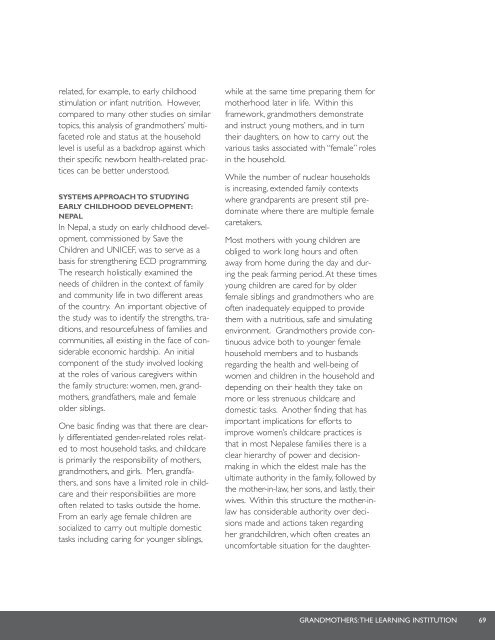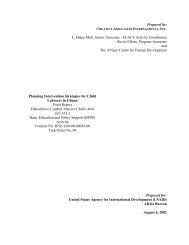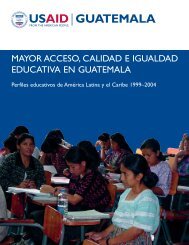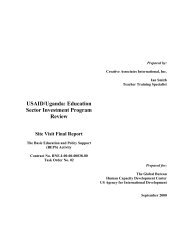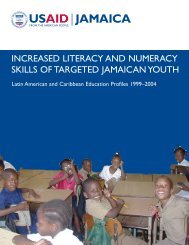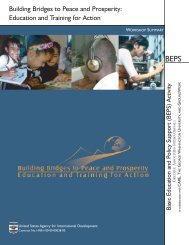Grandmothers: A Learning Institution - Basic Education and Policy ...
Grandmothers: A Learning Institution - Basic Education and Policy ...
Grandmothers: A Learning Institution - Basic Education and Policy ...
- No tags were found...
You also want an ePaper? Increase the reach of your titles
YUMPU automatically turns print PDFs into web optimized ePapers that Google loves.
elated, for example, to early childhoodstimulation or infant nutrition. However,compared to many other studies on similartopics, this analysis of gr<strong>and</strong>mothers’ multifacetedrole <strong>and</strong> status at the householdlevel is useful as a backdrop against whichtheir specific newborn health-related practicescan be better understood.SYSTEMS APPROACH TO STUDYINGEARLY CHILDHOOD DEVELOPMENT:NEPALIn Nepal, a study on early childhood development,commissioned by Save theChildren <strong>and</strong> UNICEF, was to serve as abasis for strengthening ECD programming.The research holistically examined theneeds of children in the context of family<strong>and</strong> community life in two different areasof the country. An important objective ofthe study was to identify the strengths, traditions,<strong>and</strong> resourcefulness of families <strong>and</strong>communities, all existing in the face of considerableeconomic hardship. An initialcomponent of the study involved lookingat the roles of various caregivers withinthe family structure: women, men, gr<strong>and</strong>mothers,gr<strong>and</strong>fathers, male <strong>and</strong> femaleolder siblings.One basic finding was that there are clearlydifferentiated gender-related roles relatedto most household tasks, <strong>and</strong> childcareis primarily the responsibility of mothers,gr<strong>and</strong>mothers, <strong>and</strong> girls. Men, gr<strong>and</strong>fathers,<strong>and</strong> sons have a limited role in childcare<strong>and</strong> their responsibilities are moreoften related to tasks outside the home.From an early age female children aresocialized to carry out multiple domestictasks including caring for younger siblings,while at the same time preparing them formotherhood later in life. Within thisframework, gr<strong>and</strong>mothers demonstrate<strong>and</strong> instruct young mothers, <strong>and</strong> in turntheir daughters, on how to carry out thevarious tasks associated with “female” rolesin the household.While the number of nuclear householdsis increasing, extended family contextswhere gr<strong>and</strong>parents are present still predominatewhere there are multiple femalecaretakers.Most mothers with young children areobliged to work long hours <strong>and</strong> oftenaway from home during the day <strong>and</strong> duringthe peak farming period. At these timesyoung children are cared for by olderfemale siblings <strong>and</strong> gr<strong>and</strong>mothers who areoften inadequately equipped to providethem with a nutritious, safe <strong>and</strong> simulatingenvironment. <strong>Gr<strong>and</strong>mothers</strong> provide continuousadvice both to younger femalehousehold members <strong>and</strong> to husb<strong>and</strong>sregarding the health <strong>and</strong> well-being ofwomen <strong>and</strong> children in the household <strong>and</strong>depending on their health they take onmore or less strenuous childcare <strong>and</strong>domestic tasks. Another finding that hasimportant implications for efforts toimprove women’s childcare practices isthat in most Nepalese families there is aclear hierarchy of power <strong>and</strong> decisionmakingin which the eldest male has theultimate authority in the family, followed bythe mother-in-law, her sons, <strong>and</strong> lastly, theirwives. Within this structure the mother-inlawhas considerable authority over decisionsmade <strong>and</strong> actions taken regardingher gr<strong>and</strong>children, which often creates anuncomfortable situation for the daughterGRANDMOTHERS:THE LEARNING INSTITUTION69


